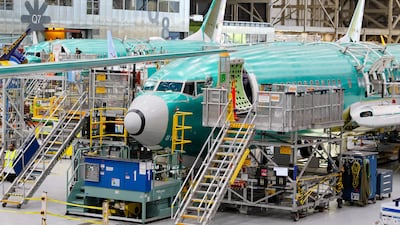Boeing's decision to plead guilty to a criminal fraud conspiracy charge, settling an investigation into two fatal 737 Max crashes, could strain its relationship with customers in the Middle East, according to experts.
The US plane manufacturer will pay a fine of $243.6 million to resolve the US Justice Department’s investigation into the two crashes, according to a court filing on Sunday.
The company has also agreed to spend $455 million over the next three years to improve its compliance and safety programmes and must hire an independent monitor to oversee the improvements.
The proposed plea agreement, which requires judicial approval, would label Boeing as a convicted felon in connection with crashes in Indonesia and Ethiopia over five months in 2018 and 2019 that resulted in the deaths of 346 people.
StrategicAero Research
“Boeing's guilty plea for misleading air-safety regulators in the wake of the 737 Max crashes will have implications for its customers in the Middle East,” Linus Bauer, founder at BAA & Partners, said.
“Firstly, trust and confidence in Boeing's products and safety protocols may be undermined, leading airlines to reconsider their existing orders or delay new purchases.”
The development could also lead Middle East regulators and airlines to enforce stricter oversight and seek stronger safety assurances from the company,
“There could also be financial repercussions, including potential compensation claims and increased insurance costs,” he said.
Flydubai, which operates an all-Boeing fleet including 54 737 Max 8s, said it would continue to engage closely with Boeing.
“We are confident that Boeing will take all necessary measures to strengthen its plans to address current issues which will further ensure optimal quality standards,” an airline official told The National on Monday.
Until a judge ratifies the plea deal, there will not be “any material changes for Boeing’s customers in the GCC”, said Saj Ahmad, chief analyst at StrategicAero Research.
“Confidence in Boeing is at an all-time low for customers across the globe – and in particular for Emirates, which is desperate to get its hands on the Boeing 777X, which is nowhere near being certified, despite being launched over a decade ago,” he said.
The 777x, the newer version of Boeing’s 777 wide-body jets, has faced years-long successive delays in its development programme. This has forced Dubai-based Emirates, the world’s largest long-haul airline, to retrofit additional 777s.
Last month, Emirates president Tim Clark said that the manufacturer should pay for the airline’s multibillion-dollar retrofit programme. The airline’s 777x order book currently has a total of 205 jets, making it the biggest buyer of Boeing wide bodies.
An Emirates official declined to comment on Boeing's plea deal.
In May, flydubai’s chief executive also said that the airline was concerned “about the delays and all the negative issues that are in the pipeline or in the media”.
“But we work closely with Boeing, they work very hard to regain the trust of the customers and we are one of their customers,” Ghaith Al Ghaith told reporters at the Arabian Travel Market in Dubai.
Earlier this year, Abu Dhabi-based Etihad Airways' chief executive said jet delivery delays by Boeing had hampered the airline's network growth plans.
The airline, whose fleet includes the Boeing 777, 787 and the 777 freighter jets, took delivery of three new 787-9 Dreamliners in February, eight months later than the scheduled handover date in June last year, which affected its route network plans, Antonoaldo Neves told The National.
Orders to fall
Boeing’s admission of guilt will probably affect new orders from airlines and may also prompt operators to reconsider operating their existing Boeing aircraft, said Mark Martin, chief executive of Martin Consulting.
“Now, there is going to be no trust left in Boeing. This is going to affect the order book.
“They [Boeing] have done this just to get themselves off the hook. Now, the easiest thing to do is just pay off people and pay off compensation and end the case,” he added.
The settlement quickly faced criticism from victims' families, who wanted Boeing to go to trial and face more severe financial penalties.
Attorneys representing some of the families stated that they plan to urge Judge Reed O'Connor, who is overseeing the case, to reject the deal.
“The families are highly disappointed that the DOJ fails to account for the two crashes,” said Robert Clifford, founder and senior partner at Clifford Law Offices.
“Much more evidence has been presented over the last five years that demonstrates that the culture of Boeing putting profits over safety hasn’t changed,” Mr Clifford said.
Earlier this year, Boeing found itself back in hot water after a door plug detached mid-flight on an Alaska Airlines 737 Max aeroplane.
The incident prompted the US Federal Aviation Administration to temporarily ground about 171 737-9 Max planes.
In response to The National’s query about Boeing’s plan to address its Middle East customers' concerns, an official referred to an 11-page summary of its 'Product Safety and Quality Plan,' which was first published in May.
The document outlines the measures being taken by the company such as more frequent inspections and stricter supplier controls.








